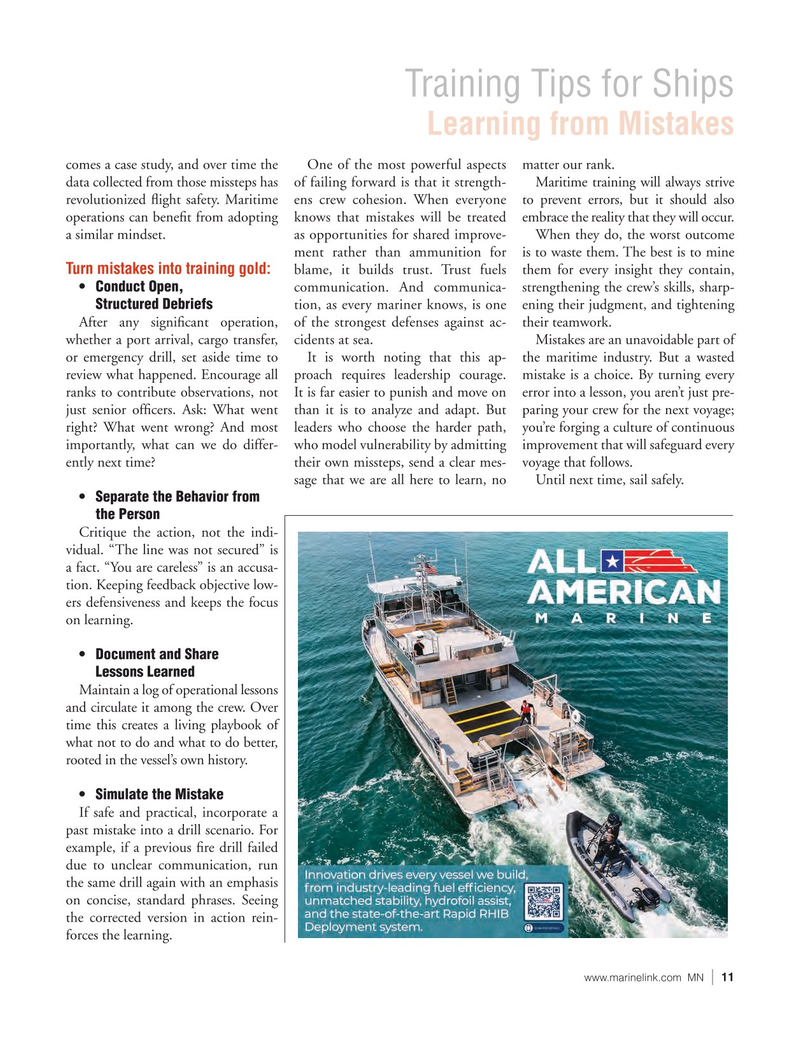
Page 11: of Marine News Magazine (September 2025)
Read this page in Pdf, Flash or Html5 edition of September 2025 Marine News Magazine
Training Tips for Ships
Learning from Mistakes comes a case study, and over time the One of the most powerful aspects matter our rank.
data collected from those missteps has of failing forward is that it strength- Maritime training will always strive revolutionized ? ight safety. Maritime ens crew cohesion. When everyone to prevent errors, but it should also operations can bene? t from adopting knows that mistakes will be treated embrace the reality that they will occur. a similar mindset. as opportunities for shared improve- When they do, the worst outcome ment rather than ammunition for is to waste them. The best is to mine blame, it builds trust. Trust fuels them for every insight they contain,
Turn mistakes into training gold: • Conduct Open, communication. And communica- strengthening the crew’s skills, sharp- Structured Debriefs tion, as every mariner knows, is one ening their judgment, and tightening
After any signi? cant operation, of the strongest defenses against ac- their teamwork.
whether a port arrival, cargo transfer, cidents at sea. Mistakes are an unavoidable part of or emergency drill, set aside time to It is worth noting that this ap- the maritime industry. But a wasted review what happened. Encourage all proach requires leadership courage. mistake is a choice. By turning every ranks to contribute observations, not It is far easier to punish and move on error into a lesson, you aren’t just pre- just senior of? cers. Ask: What went than it is to analyze and adapt. But paring your crew for the next voyage; right? What went wrong? And most leaders who choose the harder path, you’re forging a culture of continuous importantly, what can we do differ- who model vulnerability by admitting improvement that will safeguard every ently next time? their own missteps, send a clear mes- voyage that follows.
sage that we are all here to learn, no Until next time, sail safely.
• Separate the Behavior from the Person
Critique the action, not the indi- vidual. “The line was not secured” is a fact. “You are careless” is an accusa- tion. Keeping feedback objective low- ers defensiveness and keeps the focus on learning.
• Document and Share Lessons Learned
Maintain a log of operational lessons and circulate it among the crew. Over time this creates a living playbook of what not to do and what to do better, rooted in the vessel’s own history.
• Simulate the Mistake
If safe and practical, incorporate a past mistake into a drill scenario. For example, if a previous ? re drill failed due to unclear communication, run the same drill again with an emphasis on concise, standard phrases. Seeing the corrected version in action rein- forces the learning.
www.marinelink.com MN 11|

 10
10

 12
12
